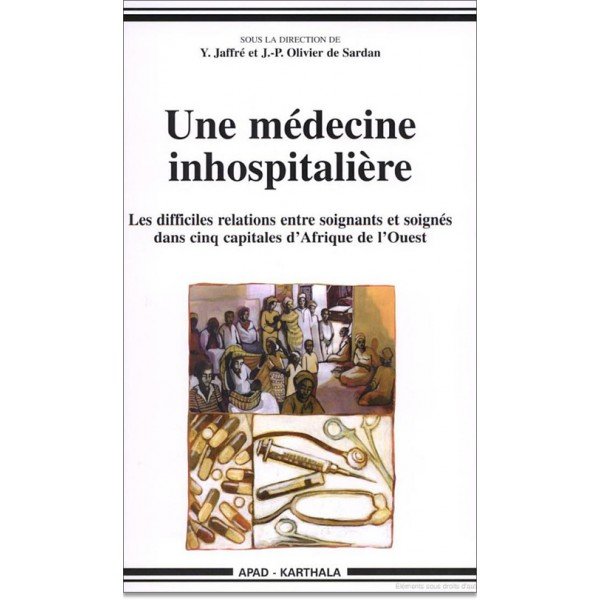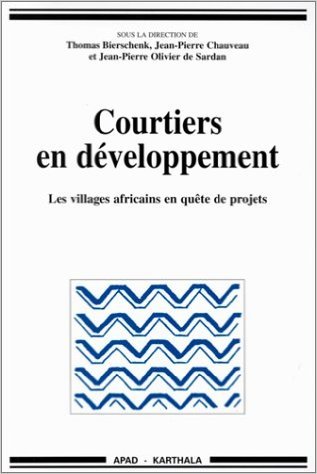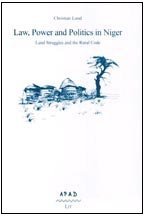
par Admin-Apad | 9 Avr 2015
Jaffré Y. et Olivier de Sardan J.-P. ed., 2003, Une médecine inhospitalière. Les difficiles relations entre soignants et soignés dans cinq capitales d’Afrique de l’ouest, Marseille/Paris, APAD/Karthala.
Dans les centres de santé publics d’Afrique de l’Ouest, les malades sont trop souvent mal reçus, mal traités et mal soignés par les personnels de santé. C’est ce que démontre de façon irrécusable cet ouvrage. Pour la première fois, un tel constat est fait publiquement sur une base empirique solide, sans complaisance mais aussi sans polémique. Bien que depuis une trentaine d’années, les réformes des systèmres de santé et les formations destinées aux soignants se soient succédées, l’insatisfaction des populations reste grande.
http://www.karthala.com/1257-une-medecine-inhospitaliere-9782845863736.html
Lire les notes de lecture dans Sciences Sociales et Santé, dans les Cahiers d’études africaines, dans Autrepart et dans le bulletin AMADES.

par Admin-Apad | 9 Avr 2015
Breusers M., 1999, On the Move ; Mobility, Land Use and Livelihood Practices on the Central Plateau in Burkina Faso, Münster, LIT/APAD.
This book analyses the complex interplay between livelihood practices in northern Burkina Faso and diverse processes of geographic mobility, among which massive migration by Moose to the south and west of the country and to the Ivory Coast. Supported by extensive ethnographic data it is demonstrated how the flexibility of land tenure arrangements allows for and is fuelled by actors geographic mobility, how the meaning of migration and the way it is embedded in social organization changed over the last century, and how differential accumulation of cattle by migrants strains relations among Moose farmers and complicates the latter relations with Fulbe herdsmen.
http://www.lit-verlag.de/isbn/3-8258-3941-9
Read the book review in the Bulletin de l’APAD

par Admin-Apad | 9 Avr 2015
Sørensen P., 2000, Money is the True Friend: Economic Practice, Morality and Trust Among the Iganga Maize Traders in Uganda, LIT Verlag Münster.
The Ugandan economy was once solidly based on the export of cash crops such as coffee and cotton. The economic crisis and the civil war in the 1970s and 1980s however profoundly changed the agricultural economy, and marketing of traditional cash crops was replaced by marketing of commercialized food crops. “Money is the true friend” deals with the emergence of de-regulated food markets for maize in Eastern Uganda. The focus is not marketing as such, but rather a new social and economic field for local traders demarcated by the involvement in three maize markets: the relief market, the Kenyan market and the domestic market. The central problem illuminated in the book is the relationship between the liberalization of food marketing and the development of a new social and cultural practice – a morality – for trading which is both shaped by and shapes the marketing opportunities for the participating traders.
http://www.lit-verlag.de/isbn/3-8258-4393-9

par Admin-Apad | 9 Avr 2015
Bierschenk T., Chauveau J.-P. et Olivier de Sardan J.-P., 2000, Courtiers en développement: les villages africains en quête de projets, Paris, APAD/Karthala.
Toute agence de coopération ou toute ONG qui monte un ” projet ” en Afrique a besoin d’interlocuteurs locaux qui expriment les ” besoins ” ou les ” attentes ” des populations, tout en les formulant dans un langage susceptible de plaire aux bailleurs de fonds. Ces intermédiaires, qui assurent l’interface entre les destinataires du projet et les institutions de développement, drainent vers les villages les ressources de l’aide (la ” rente du développement “). En fait, loin d’être les opérateurs passifs d’une logique d’assistanat, ces ” courtiers en développement ” sont les personnages clés d’une quête de projets devenue centrale dans l’Afrique contemporaine. Pour la première fois les courtiers en développement font l’objet d’une étude systématique, qui apporte une perspective nouvelle sur le monde du développement. La série d’études empiriques de cas, ici proposée, a été menée dans divers pays (Sénégal, Bénin, Niger, Togo, Kenya et Rwanda) par une équipe de chercheurs africains et européens à partir d’une problématique socio-anthropologique commune. Elle entend éviter tout préjugé, tant positif (les courtiers comme émanation d’une ” société civile ” se dressant face à l’adversité) que négatif (les courtiers comme ” profiteurs ” d’une aide mal maîtrisée). L’ouvrage comporte une contribution théorique qui dégage les acquis principaux de ces études de cas. Il situe également le phénomène des courtages dans son contexte historique et scientifique.
Lire la note de lecture de D.Gentil publiée dans la Revue Tiers-Monde
et celle de Claude Freud dans les Cahiers d’études africaines.

par Admin-Apad | 9 Avr 2015
Lund C., 1998, Law, Power and Politics in Niger. Land Struggles and the Rural Code, Hamburg/New Brunswick, LIT Verlag/Transaction Publishers/APAD.
The book analyses how the recent land tenure reform in Niger, aiming at clarification of property, caused the eruption of a massive number of conflicts. Through the detailed analysis of conflicts the book displays the complex institutional structure of dispute management and the ambiguous nature of the rules certaining to land rights. In particular, the book shows how competition over resources intertwine with institutional competition over jurisdiction in rural Niger.
http://www.lit-verlag.de/isbn/3-8258-3405-0







Recent Comments